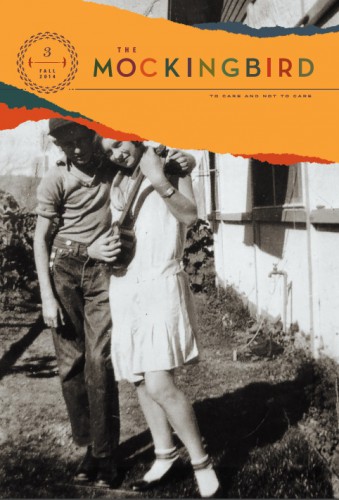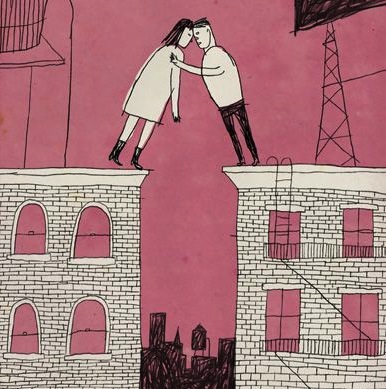
Now that the Relationship Issue is out the door, we couldn’t wait to give a little sampling of the amazing conversation we had with NYT Modern Love Editor, Daniel Jones. The full interview can, of course, be read by ordering the magazine, here, but why stop there? A subscription sounds more like it! And, while the pocketbook’s out, check out Daniel Jones’ new book, Love Illuminated: Exploring Life’s Most Mystifying Subject with the Help of 50,000 Strangers. You shan’t not be disappointed.
Mockingbird
In Love Illuminated you talk a bit about online dating and the filtering we do so arbitrarily through these sites.
Daniel Jones
It’s the whole thought process that we’re really better off in our own tribe. That’s where you’re going to find love and compatibility and passion, within whatever circle you’ve drawn. That’s where you’re more likely to get along with someone. That is just a truly misguided notion for me. And it really gets rid of any element of surprise. It puts an enormous amount of control in our own hands, even with people who’d rather not have it. There are a lot of people who wouldn’t do that naturally. They’d just sort of wander around and go to parties and go to a bar or a bowling alley or whatever and have an open mind. But technology forces them to draw these circles of exclusion. And for some people that works. It definitely opens up a world of possibility for people, and it’s really been great for people who didn’t really have access to a big circle before—and that’s the upside. But the downside is, again, this expectation that this formula is the answer. It’s going to get me closer to what I want. And there’s a lot of disappointment associated with that expectation.
Mockingbird
What gets missed in that translation of love, when it equals affinity or similarity?
DJ
It’s often true that shared interests and that sort of thing will lead to compatibility. What gets missed are these improbable connections I see in essays all the time. One of the most common stories I hear is the “overcoming the difference” story, of someone saying, “This is not someone I pictured myself with,” and yet how, especially in this environment, that’s the kind of unlikely story we try to push away. It’s like, “Wait a minute, this isn’t how I’m supposed to feel, and yet I do.” And some people avoid having that kind of encounter. They seal themselves off from that kind of encounter. I get a lot of stories, but they’re always of the surprised variety like, “Oh, I was surprised that I, a war protester, would fall in love with the S.W.A.T. team member.”
Mockingbird
Right, it’s the choice of control over vulnerability. The allergy that technology so often creates for vulnerability. Can you talk about this, the vulnerability fear? Especially as we see it in a technological age?
DJ
 I mean, it’s always been the vulnerability fear. It’s just that now we have more ways of conning ourselves out of vulnerability. The biggest self-delusion is the relationship that forms online—the kind that goes so deep so fast, that begins on social media somehow. It can feel incredibly intimate. You’re curating a certain version of yourself, amping up the ways that make you feel charismatic or appealing, and hiding those flaws and insecurities that, in person, you can’t hide. You just can’t. But online you’re all personality, and there’s the huge disconnect for people—you share so much because so little seems to be at stake. Often those relationships are from too far away to see realistically. It’s like, oh my God, you could just say anything and it’s not going to come back to haunt you. Online you’re sharing everything, and the transition into an actual meeting can be so stark, and so starkly disappointing. People are so different in comparison, and suddenly all the walls go up, and they can’t talk in the same way as they wrote. And often, people who pursue those kinds of relationships do so because they’re shy in person in the first place, and so that just compounds, like, “How close we’ve gotten and how much we’ve shared, and here we are and we can hardly talk.”
I mean, it’s always been the vulnerability fear. It’s just that now we have more ways of conning ourselves out of vulnerability. The biggest self-delusion is the relationship that forms online—the kind that goes so deep so fast, that begins on social media somehow. It can feel incredibly intimate. You’re curating a certain version of yourself, amping up the ways that make you feel charismatic or appealing, and hiding those flaws and insecurities that, in person, you can’t hide. You just can’t. But online you’re all personality, and there’s the huge disconnect for people—you share so much because so little seems to be at stake. Often those relationships are from too far away to see realistically. It’s like, oh my God, you could just say anything and it’s not going to come back to haunt you. Online you’re sharing everything, and the transition into an actual meeting can be so stark, and so starkly disappointing. People are so different in comparison, and suddenly all the walls go up, and they can’t talk in the same way as they wrote. And often, people who pursue those kinds of relationships do so because they’re shy in person in the first place, and so that just compounds, like, “How close we’ve gotten and how much we’ve shared, and here we are and we can hardly talk.”
Technology enables us to avoid being vulnerable, but only for so long. If you want to pursue a relationship, eventually the meeting is going to take place. I’ve definitely seen pieces where people get past that hurdle and it just continues like it had, but more often than not, it’s like splashing ice water on the relationship. The most interesting one to me was this college student who wrote about meeting a guy in person after they had just gotten so deep online. With them it was less that they weren’t the same people in person than that they were so used to getting their fix online that, in person, it felt uncomfortable. When they were together in person, they kept turning to the phone or the iPad or the laptop, thinking, “That’s where I’m used to getting the feeling, not with someone’s who’s next to me.” And we all feel that. We all know that lure of technology, as the thumb in our mouth, and just suckling away, feeling like it’s sustaining in some way.
Mockingbird
You also talk about how this affects the way we look at marriage, how so many people say they are “appreciatively resigned” to the monotony in marriage–and how maybe that’s not such a bad thing.
DJ
 It’s funny, because that’s the chapter that I boiled down to excerpt in the Modern Love column, and it got a ton of reactions. In fact, out of the three most popular columns we’ve ever run, the third was mine from last February, and it was an absolute split reaction. Some people said, “It’s so good to read about this” and, “I’ll raise my hand as being among the appreciatively resigned!” And the other reaction was, “Well, that was depressing,” and “That’s not going to happen to us,” and “This is what you have to do to keep your love alive.” One response was just a very (unintentionally) funny email where this woman, newly married, really castigated me for writing that and publishing it. She said, “My husband and I”—it was very New-Age—“will always love each others’ bodies, while we sit naked across from each other. The solution is to be comfortably naked in different situations.” She was just going on with these rules of how, if you’re just naked a lot, then monotony won’t happen to you. And I just said, “Well, that’s great if that works for you. Come back in ten or twenty years.” I suspect that people who are young and newly married or on their way to some sort of committed relationship just did not want to hear that, and rejected it, just absolutely rejected it.
It’s funny, because that’s the chapter that I boiled down to excerpt in the Modern Love column, and it got a ton of reactions. In fact, out of the three most popular columns we’ve ever run, the third was mine from last February, and it was an absolute split reaction. Some people said, “It’s so good to read about this” and, “I’ll raise my hand as being among the appreciatively resigned!” And the other reaction was, “Well, that was depressing,” and “That’s not going to happen to us,” and “This is what you have to do to keep your love alive.” One response was just a very (unintentionally) funny email where this woman, newly married, really castigated me for writing that and publishing it. She said, “My husband and I”—it was very New-Age—“will always love each others’ bodies, while we sit naked across from each other. The solution is to be comfortably naked in different situations.” She was just going on with these rules of how, if you’re just naked a lot, then monotony won’t happen to you. And I just said, “Well, that’s great if that works for you. Come back in ten or twenty years.” I suspect that people who are young and newly married or on their way to some sort of committed relationship just did not want to hear that, and rejected it, just absolutely rejected it.
Mockingbird
You’re right. I think that a lot of those kinds of responses are responses made in reference to the marriage they saw growing up, you know, that they saw a resigned marriage that didn’t seem all that “appreciative.”
DJ
I mean, to me, the long term relationships that I admire are so full of appreciation for each other, but when you combine that with the term ‘resign,’ people think it’s negative, but it’s really just talking about adjusting your expectations and combating the media narrative and the Hollywood narrative that is pulling everybody in the opposite direction—the one saying if you’re not passionate all the time, or if you’re not feeling in love all the time as the decades pass, there’s something wrong with you.
And this is what keeps coming up in religious circles, that there are such great expectations on love and relationships. You know, relationships used to be more practically based, and now love is what should hold us together, and so it’s a burden. It may sound liberating—and it is in some ways—but it can also be a burden to think that if we don’t feel passionate and we don’t feel in love, then what’s our reason for being together? And people didn’t use to feel that pressure. There were other pressures, financial pressures, religious pressures, whatever, but they didn’t feel that pressure. And I think that’s what needs to be adjusted in terms of how we talk about marriage in the media, and the kinds of stories we hear. The headlines ought to be something along the lines of: “Good Enough, That’s Great, and If You’re Doing Good Enough, You’re Doing Pretty Well.”
To read the interview in its entirety, say no more.

COMMENTS
Leave a Reply













